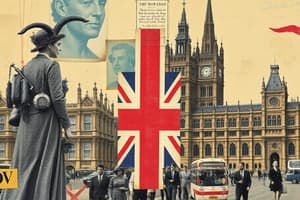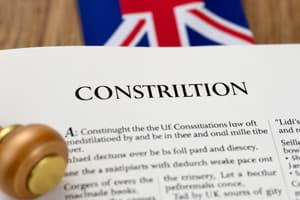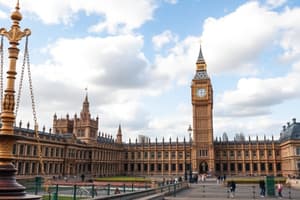Podcast
Questions and Answers
Which chamber of Parliament is composed of bishops and lords?
Which chamber of Parliament is composed of bishops and lords?
- House of Lords (correct)
- House of Commons
- The Senate
- The Crown
The House of Commons consists of 650 Members of Parliament (MPs).
The House of Commons consists of 650 Members of Parliament (MPs).
True (A)
What is the main responsibility of the House of Commons regarding the executive?
What is the main responsibility of the House of Commons regarding the executive?
Holding the executive to account
The three distinct categories of power in the separation of powers are legislative, executive, and __________.
The three distinct categories of power in the separation of powers are legislative, executive, and __________.
Match the elements of Parliament with their composition:
Match the elements of Parliament with their composition:
What does the term 'universal adult suffrage' refer to?
What does the term 'universal adult suffrage' refer to?
The Speaker of the House has the authority to maintain order during debates.
The Speaker of the House has the authority to maintain order during debates.
Name one principle of the separation of powers designed to prevent abuse of power.
Name one principle of the separation of powers designed to prevent abuse of power.
What is the supreme law-making authority in the UK?
What is the supreme law-making authority in the UK?
Parliament has limits on its power to create laws.
Parliament has limits on its power to create laws.
What are the three distinct categories of power in the separation of powers system?
What are the three distinct categories of power in the separation of powers system?
The judiciary is responsible for interpreting laws and ensuring they are consistent with the ______.
The judiciary is responsible for interpreting laws and ensuring they are consistent with the ______.
Match the following features of Parliamentary Sovereignty and their descriptions:
Match the following features of Parliamentary Sovereignty and their descriptions:
Which role has seen recent reforms that limited its influence in judicial appointments?
Which role has seen recent reforms that limited its influence in judicial appointments?
The judiciary includes judges who are elected to their positions.
The judiciary includes judges who are elected to their positions.
What is the primary purpose of the separation of powers?
What is the primary purpose of the separation of powers?
What is one requirement for a person to be eligible to vote?
What is one requirement for a person to be eligible to vote?
All individuals are eligible to stand for election if they meet certain requirements.
All individuals are eligible to stand for election if they meet certain requirements.
Who makes up the Lords Spiritual in the House of Lords?
Who makes up the Lords Spiritual in the House of Lords?
The House of Lords is an _____ chamber.
The House of Lords is an _____ chamber.
Match the following categories of House of Lords members with their descriptions:
Match the following categories of House of Lords members with their descriptions:
What is the maximum number of hereditary peers that can remain members of the House of Lords after the reform?
What is the maximum number of hereditary peers that can remain members of the House of Lords after the reform?
The legislative process in the UK does not involve the House of Lords.
The legislative process in the UK does not involve the House of Lords.
What is a bill?
What is a bill?
Which of the following is NOT a source of constitutional law in the UK?
Which of the following is NOT a source of constitutional law in the UK?
The unwritten constitution of the UK is comprised solely of legal sources.
The unwritten constitution of the UK is comprised solely of legal sources.
What principle holds that everyone, including government officials, is subject to the law?
What principle holds that everyone, including government officials, is subject to the law?
Parliament is considered the _____ law-making authority in the UK.
Parliament is considered the _____ law-making authority in the UK.
Which of the following is an advantage of constitutional conventions?
Which of the following is an advantage of constitutional conventions?
Procedural limits of the law mean that individuals do not have access to justice.
Procedural limits of the law mean that individuals do not have access to justice.
Match the following constitutional principles with their descriptions:
Match the following constitutional principles with their descriptions:
Name one key element of the Rule of Law.
Name one key element of the Rule of Law.
Which of the following is NOT a key requirement for a judicial review action?
Which of the following is NOT a key requirement for a judicial review action?
The principle of parliamentary sovereignty means that Parliament is bound by its previous laws.
The principle of parliamentary sovereignty means that Parliament is bound by its previous laws.
What does the rule of law stipulate regarding government and citizens?
What does the rule of law stipulate regarding government and citizens?
Constitutional law helps to protect individual rights, such as the right to freedom of ______.
Constitutional law helps to protect individual rights, such as the right to freedom of ______.
Match the following principles of constitutional law with their descriptions:
Match the following principles of constitutional law with their descriptions:
What is the purpose of constitutional law in practice regarding government power?
What is the purpose of constitutional law in practice regarding government power?
Constitutional law ensures that the government acts in a transparent and unlawful manner.
Constitutional law ensures that the government acts in a transparent and unlawful manner.
How does constitutional law promote accountability in government?
How does constitutional law promote accountability in government?
What does parliamentary sovereignty imply?
What does parliamentary sovereignty imply?
Parliamentary privilege allows members to perform their duties without facing external interference.
Parliamentary privilege allows members to perform their duties without facing external interference.
Who is known for the book 'Introduction to the Study of the Law of the Constitution'?
Who is known for the book 'Introduction to the Study of the Law of the Constitution'?
A ____ is a document issued by the Government that sets out its policies on a specific issue.
A ____ is a document issued by the Government that sets out its policies on a specific issue.
Match the following terms with their definitions:
Match the following terms with their definitions:
Which of the following is the first step in the parliamentary process for a public bill?
Which of the following is the first step in the parliamentary process for a public bill?
The 'first past the post' system requires a candidate to secure a certain percentage of votes to win.
The 'first past the post' system requires a candidate to secure a certain percentage of votes to win.
What is the primary responsibility of the Treasury in the government structure?
What is the primary responsibility of the Treasury in the government structure?
The ____ party is associated with those wanting Northern Ireland to remain part of the United Kingdom.
The ____ party is associated with those wanting Northern Ireland to remain part of the United Kingdom.
What stage follows the committee stage in the parliamentary process?
What stage follows the committee stage in the parliamentary process?
Flashcards
Parliamentary Sovereignty: Supreme Law-Making Authority
Parliamentary Sovereignty: Supreme Law-Making Authority
Parliament, the legislative body, has the supreme authority to create, change, or abolish any law without limitations on its power.
Parliamentary Sovereignty: Cannot Bind Successors
Parliamentary Sovereignty: Cannot Bind Successors
Parliament cannot restrict the power of future Parliaments to alter or overturn laws passed by previous Parliaments.
Separation of Powers
Separation of Powers
The principle of dividing governmental power among three distinct branches: legislative (lawmaking), executive (law enforcement), and judicial (law interpretation).
Legislative Branch (Separation of Powers)
Legislative Branch (Separation of Powers)
Signup and view all the flashcards
Executive Branch (Separation of Powers)
Executive Branch (Separation of Powers)
Signup and view all the flashcards
Judicial Branch (Separation of Powers)
Judicial Branch (Separation of Powers)
Signup and view all the flashcards
Role of the Judiciary
Role of the Judiciary
Signup and view all the flashcards
Lord Chancellor
Lord Chancellor
Signup and view all the flashcards
UK Constitution
UK Constitution
Signup and view all the flashcards
Constitutional Conventions
Constitutional Conventions
Signup and view all the flashcards
The Rule of Law
The Rule of Law
Signup and view all the flashcards
Parliamentary Sovereignty
Parliamentary Sovereignty
Signup and view all the flashcards
Supremacy of the Law
Supremacy of the Law
Signup and view all the flashcards
Non-retroactivity
Non-retroactivity
Signup and view all the flashcards
Procedural Limits
Procedural Limits
Signup and view all the flashcards
Equality before the Law
Equality before the Law
Signup and view all the flashcards
What is the role of the Crown in Parliament?
What is the role of the Crown in Parliament?
Signup and view all the flashcards
What is the House of Lords?
What is the House of Lords?
Signup and view all the flashcards
What is the House of Commons?
What is the House of Commons?
Signup and view all the flashcards
What is the Separation of Powers?
What is the Separation of Powers?
Signup and view all the flashcards
Explain the principle of 'Prevention of Abuse of Power' in the Separation of Powers.
Explain the principle of 'Prevention of Abuse of Power' in the Separation of Powers.
Signup and view all the flashcards
Explain the principle of 'Protection of Individual Rights' in the Separation of Powers.
Explain the principle of 'Protection of Individual Rights' in the Separation of Powers.
Signup and view all the flashcards
Explain the principle of 'Checks and Balances' in the Separation of Powers.
Explain the principle of 'Checks and Balances' in the Separation of Powers.
Signup and view all the flashcards
Describe the House of Commons.
Describe the House of Commons.
Signup and view all the flashcards
Who Can Vote in the UK?
Who Can Vote in the UK?
Signup and view all the flashcards
What Disqualifies Someone from Voting?
What Disqualifies Someone from Voting?
Signup and view all the flashcards
Who Cannot Stand for Election in the UK?
Who Cannot Stand for Election in the UK?
Signup and view all the flashcards
What are the Types of Members in the House of Lords?
What are the Types of Members in the House of Lords?
Signup and view all the flashcards
How are Hereditary and Life Peers Appointed?
How are Hereditary and Life Peers Appointed?
Signup and view all the flashcards
What was the Impact of the House of Lords Act 1999?
What was the Impact of the House of Lords Act 1999?
Signup and view all the flashcards
How are Life Peers Appointed in Practice?
How are Life Peers Appointed in Practice?
Signup and view all the flashcards
Parliamentary Privilege
Parliamentary Privilege
Signup and view all the flashcards
Constitutional Principles
Constitutional Principles
Signup and view all the flashcards
Cross-bencher
Cross-bencher
Signup and view all the flashcards
First Past the Post
First Past the Post
Signup and view all the flashcards
Unionists
Unionists
Signup and view all the flashcards
Whips
Whips
Signup and view all the flashcards
White Paper
White Paper
Signup and view all the flashcards
Parliamentary Process
Parliamentary Process
Signup and view all the flashcards
Three-line Whip
Three-line Whip
Signup and view all the flashcards
Rule of Law
Rule of Law
Signup and view all the flashcards
Limiting Government Power
Limiting Government Power
Signup and view all the flashcards
Protecting Individual Rights
Protecting Individual Rights
Signup and view all the flashcards
Promoting the Rule of Law
Promoting the Rule of Law
Signup and view all the flashcards
Locus Standi
Locus Standi
Signup and view all the flashcards
Time Limits
Time Limits
Signup and view all the flashcards
Study Notes
Introduction to Constitutional Law
- The UK has an unwritten constitution, comprised of various instruments and conventions
- Constitutional law sources are categorized as legal (statutes, case law) and non-legal (conventions, unwritten rules)
Constitutional Conventions
- Conventions are important sources of constitutional law
- They are unwritten rules based on tradition, custom, and precedent
- They can be adapted to changing circumstances
- Conventions are not legally enforceable but are widely accepted and followed
Important Constitutional Principles
- The Rule of Law: Everyone (including officials) is subject to the law, and no one is above it
- Parliamentary Sovereignty: Parliament is the supreme law-making authority in the UK
The Rule of Law
- The law is the highest authority
- Everyone is subject to the law
- Laws should not be applied retroactively
- Procedures for exercising power should be clear
- Individuals should have access to fair justice
Parliamentary Sovereignty
- Parliament has the supreme law-making authority
- There are no limits on Parliament's power to make laws
- Parliament cannot bind its successors
- Parliament can repeal or amend its own laws
The Separation of Powers
- Power is divided into three distinct branches
- Legislative (makes laws)
- Executive (enforces laws)
- Judicial (interprets laws)
- This division prevents any one branch from becoming too powerful
- It protects individual rights and prevents abuse of power
The Role of the Judiciary
- The judiciary plays a vital role in interpreting laws and upholding the constitution
- Judges are appointed to their positions and are responsible for applying the law fairly
The Role of the Lord Chancellor
- The Lord Chancellor is a high-ranking official
- They play a key role in judicial appointments
- Recent reforms have limited their role in this process
The Composition of Parliament
- Parliament is composed of the Crown, House of Lords, and House of Commons
Definition of the Separation of Powers
- Power is divided into legislative, executive, and judicial categories
- This division prevents abuse of power
Key Principles of the Separation of Powers
- Prevention of abuse of power
- Protection of individual rights
- Checks and balances
The House of Commons
- The House of Commons is the lower house of Parliament
- It consists of 650 Members of Parliament (MPs)
- The Speaker of the House ensures order during debates
Responsibilities of the House of Commons
- Holding the executive to account
- Allowing the government to raise taxes
- Providing a forum for debate on national interest
The Right To Vote
- Voting is based on universal adult suffrage
- Eligibility criteria include being over 18, on the electoral register, and not disqualified
Eligibility To Stand for Election
- Certain individuals are disqualified from running for election (e.g., certain convicted criminals)
The House of Lords
- The House of Lords is the upper house of Parliament
- The House of Lords currently has around 800 members
- The composition includes Lords Spiritual and Lords Temporal (hereditary and life peers)
Reform of the House of Lords
- The House of Lords Act 1999 abolished the automatic right of hereditary peers to remain in the Lords
Appointment of Life Peers
- Life peers are appointed by the monarch, on the advice of the Prime Minister
- They are nominated by political party leaders
Introduction of Bills
- A bill is a proposed law
- Public bills are introduced by ministers
- Public bills have a higher chance of success
- Private bills are introduced by non-ministerial members
- Bills undergo several stages (first reading, second reading, committee stage, report stage, third reading)
The Role of the Monarch
- The monarch plays a role in the legislative process through Royal Assent
- But their power to refuse Royal Assent is limited
The Parliament Acts
- The Parliament Acts of 1911 and 1949 limit the House of Lords' power to delay or reject bills
- The House of Commons can override a House of Lords rejection
Royal Assent
- Royal Assent is the final stage of the legislative process
- The monarch formally approves a bill
- Their role is largely a convention, meaning it is exercised in accordance with the Prime Minister's advice
Devolution
- Devolution transfers power from central authority to regional/local authorities
- This can result in the creation of regional assemblies
Composition of Regional Assemblies
- Table summarizing the composition of regional UK assemblies
Role of the Sovereign
- The sovereign has multiple roles in government, including governing the Church of England, being a Commonwealth member, and exercising Royal Assent
Key Concepts
- Links constitutional law to legislative processes
- Discusses parliamentary sovereignty
- Explains devolution
- Lists key concepts of constitutional law
Key Concepts
- Summarizes fundamental principles of constitutional law
Judicial Review
- Judicial review process and requirements
- Locus standi
- Judgments being within a reasonable time
Key Principles
- Summarizes key principles: parliamentary sovereignty, rule of law, separation of powers
Constitutional Law in Practice
- Discusses how constitutional law is used to limit government power, protect individual rights, and promote the rule of law
- Provides a table illustrating the key areas where constitutional law is applied
Parliamentary Process
- Outlines the stages involved in the parliamentary process of a public bill
- Includes details about different documents involved (e.g., Green paper)
Studying That Suits You
Use AI to generate personalized quizzes and flashcards to suit your learning preferences.




